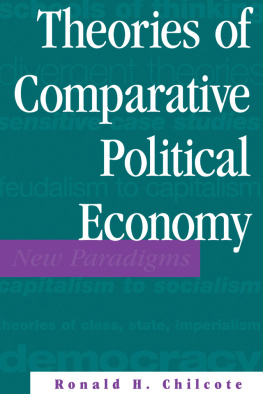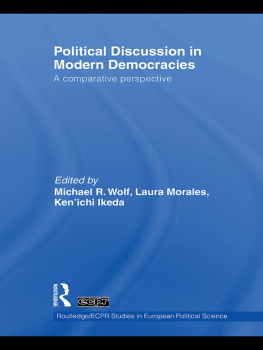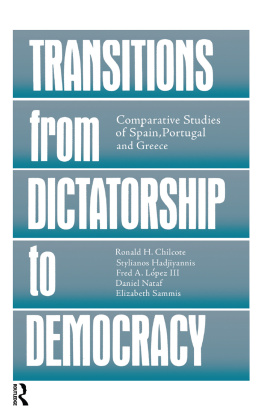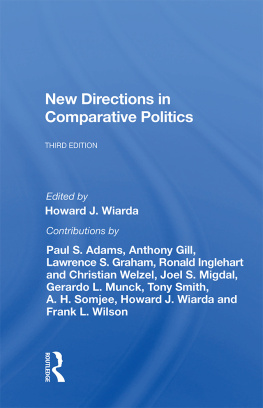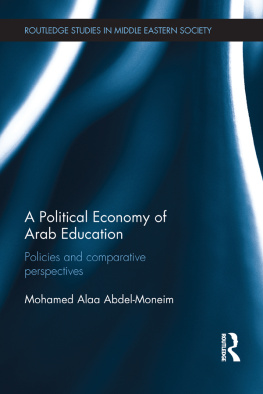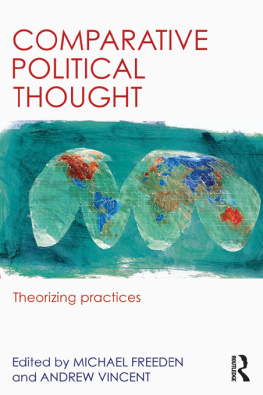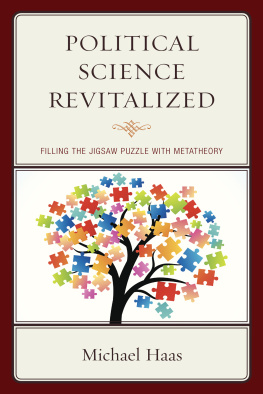THEORIES OF COMPARATIVE POLITICAL ECONOMY
OTHER BOOKS BY RONALD H. CHILCOTE
Imperialism: Theoretical Directions (editor, 2000)
Comparative Inquiry in Politics and Political Economy:
Theories and Issues (1999)
Political Economy of Imperialism:
Critical Appraisals (editor, 1999)
Theories of Comparative Politics:
The Search for a Paradigm Reconsidered (1981, 1994)
Amilcar Cabral's Revolutionary Theory and Practice:
A Critical Guide (1991)
Power and the Ruling Classes in Northeast Brazil:
Juazeiro and Petrolina in Transition (1990)
Latin America: Capitalist and Socialist Perspectives of
Development and Underdevelopment (with Joel C. Edelstein, 1986)
Theories of Development and Underdevelopment (1984)
Dependency and Marxism: Toward a Resolution of
the Debate (editor, 1982)
The Brazilian Communist Party:
Conflict and Integration, 1922-1972 (1974)
Latin America: The Struggle with Dependency and Beyond
(edited with Joel C. Edelstein, 1974)
Protest and Resistance in Angola and Brazil:
Comparative Studies (editor, 1972)
THEORIES OF COMPARATIVE POLITICAL ECONOMY
Ronald H. Chilcote
University of California at Riverside
First published 2000 by Westview Press
Published 2018 by Routledge
711 Third Avenue, New York, NY 10017, USA
2 Park Square, Milton Park, Abingdon, Oxon OX14 4RN
Routledge is an imprint of the Taylor & Francis Group, an informa business
Copyright 2000 Taylor & Francis
All rights reserved. No part of this book may be reprinted or reproduced or utilised in any form or by any electronic, mechanical, or other means, now known or hereafter invented, including photocopying and recording, or in any information storage or retrieval system, without permission in writing from the publishers.
Notice:
Product or corporate names may be trademarks or registered trademarks, and are used only for identification and explanation without intent to infringe.
Library of Congress Cataloging-in-Publication Data
Chilcote, Ronald H.
Theories of comparative political economy / Ronald H. Chilcote.
p. cm.
Includes bibliographical references and index.
ISBN 0-8133-1018-0 (hc.)ISBN 0-8133-1019-9 (pbk.)
1. Comparative government. I. Title.
JF51.C44 2000
320.3dc21 99-088513
CIP
ISBN 13: 978-0-8133-1019-0 (pbk)
TO
FRANCES,
STEPHEN, AND EDWARD
CONTENTS
Guide
Nearly two decades ago, I began assembling a critical overview of the field of comparative politics. I hoped to bring order to a diverse field and to overcome my dissatisfaction with the literature, which at the introductory level tended to emphasize configurative and formal-legal studies of dominant European countries such as England, France, Germany, and the Soviet Union, whereas the advanced level offered general and often poorly informed understandings of the historical experience, often devoid of any theoretical considerations. This effort resulted in the publication in 1981 of a book, Theories of Comparative Politics: The Search for a Paradigm , in which I argued that political science and political economy are deeply influenced by ideology. No matter what our concern for science and objectivity, politics has an impact on the profession, and any pretense of value-free inquiry is imbued with conservative and antipolitical biases. Additionally, I argued that comparative politics embraces all levels of politics: The study of politics everywhere is comparative. I set forth the proposition that the study of politics has been largely shaped by the reproduction of traditional ideas and approaches, the result being the prevalence of an orthodox mainstream and a reluctance to seek radical alternatives. I traced this notion to inquiry emanating from the nineteenth century in order to reveal at least two patterns of thought, one around the ideas of Max Weber, which today influence the mainstream, and the other around the ideas of Karl Marx, which have influenced the pursuit of alternative explanations.
Theories of the political system were contrasted with those of the state; both conservative and progressive ideas were associated with a politics of culture; distinctions were drawn between theories of development and theories of underdevelopment; and theories of class were assessed in light of pluralism, instrumentalism, and structuralism. Recognition of differences in thought stimulates critical thinking, opens up dialogue to more than a prevailing mode of explanation, and provides choice in the formulation and reinforcement of individual perspectives. In short, in comparative inquiry the reader is challenged to weigh arguments, find positions, and defend ideas.
My book concluded with a plea for adopting a political-economic approach in the search for a paradigm. I traced the origins and evolution of political economy in its Marxist and non-Marxist forms since the nineteenth century and identified some of the prevailing schools of thought, leaving the reader with guidelines, theories, concepts, and methods that might be useful in pursuing this direction.
This present book builds on the proposition that the study of politics and economics has evolved into political economy in a number of significant ways and that the new issues and ideas that became prominent in the 1980s and 1990s will carry on into the new millennium. The book is organized around six chapters. The first examines significant comparative historical themes and case studies that emphasize theoretically oriented analysis. Among the important issues emanating from this work are the agrarian transition to capitalism and the rise of the absolute state, and the role of revolution. The second chapter explores the transitions from feudalism to capitalism and capitalism to socialism. The third chapter turns to theories of class. The fourth chapter examines theories of the state, tracing the origins and evolution of the state in formulations from Hegel through Marx and Engels to Lenin, Gramsci, Poulantzas, and Miliband. The fifth chapter on the theories of imperialism looks at capitalist and socialist development, with attention to capital accumulation, relations of production, and forces of production. The final chapter examines democracy from the perspective of political economy, describing its representative, indirect, and bourgeois as opposed to its direct participatory forms and recognizing the many socialismssocial democratic, democratic socialist, orthodox socialist, and revolutionary socialistand considers new and old themes in the struggle for a progressive democratic socialism.
I would like to express my gratitude to persons who read portions or all the manuscript at various stages. Students in my seminar "Political Economy of Imperialism," in particular Matt Cowell, Katie Ghost, Stan Mallison, Monica Martins, Pamela Stricker, Michele Weber, and Bassam Y. Yousif, provided suggestions and input for couraged me to finish this work over five years of writing and facilitated its editing and revision.
Finally, I am especially appreciative of the support of my wife, Frances, and my sons, Stephen and Edward. This project has been many years in preparation and frequently interfered with our precious time together, and I wish to dedicate this book to them.

